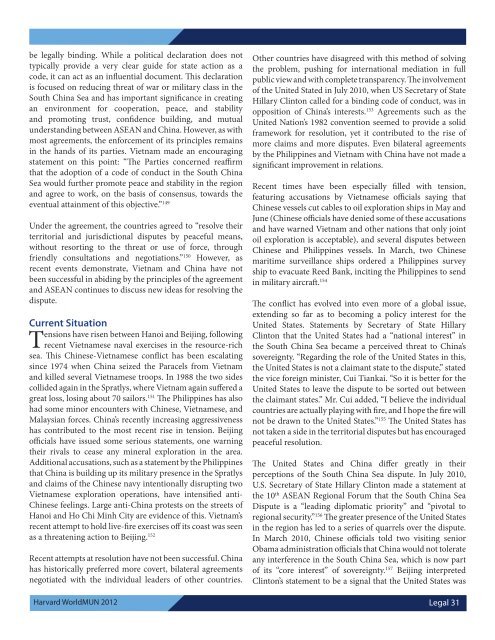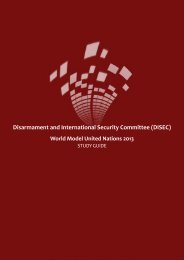Legal Committee - World Model United Nations
Legal Committee - World Model United Nations
Legal Committee - World Model United Nations
Create successful ePaper yourself
Turn your PDF publications into a flip-book with our unique Google optimized e-Paper software.
e legally binding. While a political declaration does not<br />
typically provide a very clear guide for state action as a<br />
code, it can act as an influential document. This declaration<br />
is focused on reducing threat of war or military class in the<br />
South China Sea and has important significance in creating<br />
an environment for cooperation, peace, and stability<br />
and promoting trust, confidence building, and mutual<br />
understanding between ASEAN and China. However, as with<br />
most agreements, the enforcement of its principles remains<br />
in the hands of its parties. Vietnam made an encouraging<br />
statement on this point: “The Parties concerned reaffirm<br />
that the adoption of a code of conduct in the South China<br />
Sea would further promote peace and stability in the region<br />
and agree to work, on the basis of consensus, towards the<br />
eventual attainment of this objective.” 149<br />
Under the agreement, the countries agreed to “resolve their<br />
territorial and jurisdictional disputes by peaceful means,<br />
without resorting to the threat or use of force, through<br />
friendly consultations and negotiations.” 150 However, as<br />
recent events demonstrate, Vietnam and China have not<br />
been successful in abiding by the principles of the agreement<br />
and ASEAN continues to discuss new ideas for resolving the<br />
dispute.<br />
Current Situation<br />
Tensions have risen between Hanoi and Beijing, following<br />
recent Vietnamese naval exercises in the resource-rich<br />
sea. This Chinese-Vietnamese conflict has been escalating<br />
since 1974 when China seized the Paracels from Vietnam<br />
and killed several Vietnamese troops. In 1988 the two sides<br />
collided again in the Spratlys, where Vietnam again suffered a<br />
great loss, losing about 70 sailors. 151 The Philippines has also<br />
had some minor encounters with Chinese, Vietnamese, and<br />
Malaysian forces. China’s recently increasing aggressiveness<br />
has contributed to the most recent rise in tension. Beijing<br />
officials have issued some serious statements, one warning<br />
their rivals to cease any mineral exploration in the area.<br />
Additional accusations, such as a statement by the Philippines<br />
that China is building up its military presence in the Spratlys<br />
and claims of the Chinese navy intentionally disrupting two<br />
Vietnamese exploration operations, have intensified anti-<br />
Chinese feelings. Large anti-China protests on the streets of<br />
Hanoi and Ho Chi Minh City are evidence of this. Vietnam’s<br />
recent attempt to hold live-fire exercises off its coast was seen<br />
as a threatening action to Beijing. 152<br />
Recent attempts at resolution have not been successful. China<br />
has historically preferred more covert, bilateral agreements<br />
negotiated with the individual leaders of other countries.<br />
Other countries have disagreed with this method of solving<br />
the problem, pushing for international mediation in full<br />
public view and with complete transparency. The involvement<br />
of the <strong>United</strong> Stated in July 2010, when US Secretary of State<br />
Hillary Clinton called for a binding code of conduct, was in<br />
opposition of China’s interests. 153 Agreements such as the<br />
<strong>United</strong> Nation’s 1982 convention seemed to provide a solid<br />
framework for resolution, yet it contributed to the rise of<br />
more claims and more disputes. Even bilateral agreements<br />
by the Philippines and Vietnam with China have not made a<br />
significant improvement in relations.<br />
Recent times have been especially filled with tension,<br />
featuring accusations by Vietnamese officials saying that<br />
Chinese vessels cut cables to oil exploration ships in May and<br />
June (Chinese officials have denied some of these accusations<br />
and have warned Vietnam and other nations that only joint<br />
oil exploration is acceptable), and several disputes between<br />
Chinese and Philippines vessels. In March, two Chinese<br />
maritime surveillance ships ordered a Philippines survey<br />
ship to evacuate Reed Bank, inciting the Philippines to send<br />
in military aircraft. 154<br />
The conflict has evolved into even more of a global issue,<br />
extending so far as to becoming a policy interest for the<br />
<strong>United</strong> States. Statements by Secretary of State Hillary<br />
Clinton that the <strong>United</strong> States had a “national interest” in<br />
the South China Sea became a perceived threat to China’s<br />
sovereignty. “Regarding the role of the <strong>United</strong> States in this,<br />
the <strong>United</strong> States is not a claimant state to the dispute,” stated<br />
the vice foreign minister, Cui Tiankai. “So it is better for the<br />
<strong>United</strong> States to leave the dispute to be sorted out between<br />
the claimant states.” Mr. Cui added, “I believe the individual<br />
countries are actually playing with fire, and I hope the fire will<br />
not be drawn to the <strong>United</strong> States.” 155 The <strong>United</strong> States has<br />
not taken a side in the territorial disputes but has encouraged<br />
peaceful resolution.<br />
The <strong>United</strong> States and China differ greatly in their<br />
perceptions of the South China Sea dispute. In July 2010,<br />
U.S. Secretary of State Hillary Clinton made a statement at<br />
the 10 th ASEAN Regional Forum that the South China Sea<br />
Dispute is a “leading diplomatic priority” and “pivotal to<br />
regional security.” 156 The greater presence of the <strong>United</strong> States<br />
in the region has led to a series of quarrels over the dispute.<br />
In March 2010, Chinese officials told two visiting senior<br />
Obama administration officials that China would not tolerate<br />
any interference in the South China Sea, which is now part<br />
of its “core interest” of sovereignty. 157 Beijing interpreted<br />
Clinton’s statement to be a signal that the <strong>United</strong> States was<br />
Harvard <strong>World</strong>MUN 2012 <strong>Legal</strong> 31

















